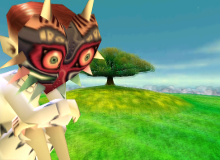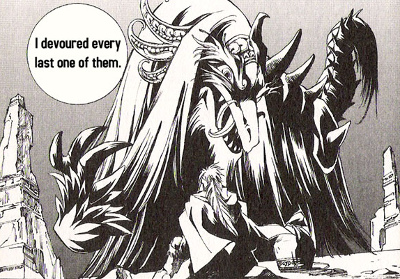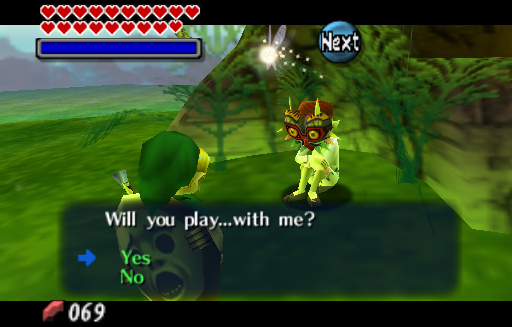Zelda Moments: The Skull Kid and the Moon Children
Posted on October 24 2013 by Axle D. Wilder
 Majora’s Mask is “that” Zelda game. For a while considered the black sheep of the series or an underrated gem — though it’s really neither by this point — it’s perhaps most of all seen as a very mysterious and strange game. Scenes are often surreal and indistinct, confusing, or just thought-provoking. And many of the plot points are not well-explained, with unclear origins. I’ve always been a fan of looking at its mysteries and trying to figure them out, so maybe it’s ironic that one of the game’s biggest mysteries has, in my book, the most simple explanation.
Majora’s Mask is “that” Zelda game. For a while considered the black sheep of the series or an underrated gem — though it’s really neither by this point — it’s perhaps most of all seen as a very mysterious and strange game. Scenes are often surreal and indistinct, confusing, or just thought-provoking. And many of the plot points are not well-explained, with unclear origins. I’ve always been a fan of looking at its mysteries and trying to figure them out, so maybe it’s ironic that one of the game’s biggest mysteries has, in my book, the most simple explanation.
At the end of the game, after stopping the moon’s initial descent, freeing the Skull Kid from Majora’s Mask, and then chasing the sentient mask into the moon itself to stop it, the player discovers… um… is that a field? With a big tree? And… children playing?
Yeah it was a weird scene; Majora’s Mask definitely trumped itself with this one! The innards of the moon are surreal in general — even sporting the strange blurring effect seen other times during the game’s many dreamlike cutscenes — but no aspect of them is stranger than its denizens: Five children wearing the masks of the game’s four dungeon bosses and Majora’s Mask.
Children in the grassy plain inside of the scary-faced moon… wearing scary masks… playing. Seems reasonable.
Oh, and asking cryptic questions about friendship and happiness!
“You… What makes you…happy? I wonder… What makes you happy… Does it make…others happy, too?”
“The right thing…What is it? I wonder… If you do the right thing… Does it really make… everybody…happy?”
“Your true face… What kind of…face is it? I wonder… The face under the mask… Is that…your true face?”
A popular theory is that these quotes, the Majora Child wanting to “play” with you, and the silly movements and giggling of Majora’s Incarnation, all indicate that the entity within the mask is childlike, and it’s just causing destruction in its attempt to play or its desire for attention. Certainly, Majora is portrayed this way in the Majora’s Mask manga. The manga, however, is non-canonical, and even if it were canonical, its own backstory for Majora’s Mask completely contradicts the childlike explanation.

Instead, the manga ran with and focused on Majora’s Mask’s core theme, adapting it further than the game did to the villain itself: Friendship.
There’s absolutely no mistaking that the game is about friendship. Link starts the game’s journey searching for his friend, and helps various friends and families throughout the game. Furthermore, the backstory between the Skull Kid and the Four Giants is one of friendship, as is that of the Skull Kid and the two fairies. The game even ends off with Link and the Skull Kid becoming friends, while one of the enemies in the last region of the game still blames the horrible fate of Ikana, due to a curse of undeath, on sucking as friends:
My point is this: Friendship is a core theme of the game, so it’s not really that mysterious that, during its climax, the game is heavily laden with that theme. The moon sequence is surreal in general, but beyond that general surrealism, the quotes aren’t really that surprising. And I don’t think they relate to Majora either, because of how Majora behaves.
“A puppet that can no longer be used is mere garbage. This puppet’s role has just ended…”
“I…I shall consume. Consume…Consume everything.”
 These are the only lines that Majora — or the entity within the mask, or whatever you want to call it — says. And none of them are childlike. Arrogance and analysis of the Skull Kid’s strength, likening him to a tool and casting him aside due to uselessness (as opposed to from boredom, like a child would), and then a mindless desire to consume and destroy. It’s rather clear that Majora was no Pitch Black from Rise of the Guardians; he wasn’t inherently lonely and manifesting his sorrow in an evil and destructive way. Majora was Hexxus from FernGully; a mindless spirit of death and destruction who was put into the story as a foil to the inherently bright theme of the game. In FernGully, the story is about life and love and creation — a happy message — with Hexxus as the horrible opposition to that which must be stopped, showing the strength of all those good things over evil. Majora is the same foil for the theme of friendship. Majora’s Mask is a game about friendship, forgiveness, and just plain old helping people… and your ultimate goal is to stop a beast of mindless destruction that only lives to inflict pain.
These are the only lines that Majora — or the entity within the mask, or whatever you want to call it — says. And none of them are childlike. Arrogance and analysis of the Skull Kid’s strength, likening him to a tool and casting him aside due to uselessness (as opposed to from boredom, like a child would), and then a mindless desire to consume and destroy. It’s rather clear that Majora was no Pitch Black from Rise of the Guardians; he wasn’t inherently lonely and manifesting his sorrow in an evil and destructive way. Majora was Hexxus from FernGully; a mindless spirit of death and destruction who was put into the story as a foil to the inherently bright theme of the game. In FernGully, the story is about life and love and creation — a happy message — with Hexxus as the horrible opposition to that which must be stopped, showing the strength of all those good things over evil. Majora is the same foil for the theme of friendship. Majora’s Mask is a game about friendship, forgiveness, and just plain old helping people… and your ultimate goal is to stop a beast of mindless destruction that only lives to inflict pain.
Instead, the “Pitch Black” of the story is the Skull Kid. A lonely character, in this case used and corrupted by Majora. Throughout the game we learn of sinister and malicious pranks performed with the mask’s power, and I’ve always interpreted these as acts of evil performed by Majora, but filtered through the Skull Kid’s mischief; as the Skull Kid was his host, Majora filtered its evil destruction through the Skull Kid’s means and style.
More to the point, nearly every quote of the Moon Children directly relates to the Skull Kid. “Do your friends think of you as a friend?” is based on the Skull Kid’s sadness at being abandoned by the Four Giants… or even him hurting Tatl and Tael and being cruel to them. “Does what makes you happy make others happy too?” relates to the Skull Kid’s mischief. It’s what he did without his old friends, and it hurt people and caused the Giants, in the past, to force him to stop in protection of the people of Termina. “If you do the right thing, does it make everybody happy?” relates to Link, who saves the Skull Kid and whom the Skull Kid befriends, and would seem to be a form of confronting all the evil that the Skull Kid has inflicted on people as he considers doing the opposite. “Is the face under your mask your true face?” is the most cryptic, but could relate to the Skull Kid’s face being unknown throughout the game, or more probably, the fact that his personality is overtaken by Majora’s for much of the story… as well as that Majora’s was masked by his.
Perhaps more than these lines indicate the Skull Kid, they simply are meant to represent the core themes of the game. It wouldn’t be hard to imagine since the game is so surreal in general; why wouldn’t it just throw in characters to monologue about its themes in a dream sequence? That said I think it just as easily can be taken as a spirit world or dream connected to Majora, containing echoes of his time with the Skull Kid. The lonely child under the tree represents the Skull Kid himself, wearing the mask he wore for most of the game, while the four playing children, wearing the masks in which the Four Giants were imprisoned, represent them.

That’s really all I have to say about it. I can’t see Majora as a childlike figure, just a force of malice and destruction. Instead I think this enigmatic sequence represents the core plotline of the game — in which Majora is almost incidental — as well as its themes. Perhaps it’s something explainable, like a dream echo of the Skull Kid left within Majora’s subconscious, or perhaps it’s simply a weird scene to carry those themes. Either way I think that’s the best way to interpret it.
Tell me your thoughts on this moment in the comments! Do you think my theory is on the mark, or do you have another way of looking at it?



